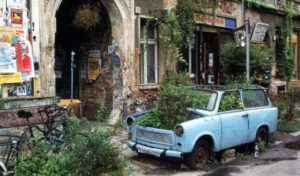After the fall of the Berlin Wall, a group of squatters from East and West set out to build their own unified Germany. And, despite endless parties, questionable hygiene, and neo-Nazi turf wars, they pulled it off.
On a Saturday last March, my Berlin neighbors had a plant funeral. They set up three-meter-high wood crosses on our street corner and placed funeral candles all along the street, and the children drew posters of crying trees and flowers. There was live music, and everyone got quite drunk. Other longtime residents of our neighborhood pitched in with donations, and a week later, many of the plants that the city had dared to remove from in front of our building had been replaced. One of the crosses remains by our entrance, a reminder not to mess with Tucholskystrasse 30 and 32.
My neighbors don’t take kindly to authority. They are used to running their own affairs. After all, they have been doing so since early 1990, when they spearheaded the third wave of the Berlin squatter movement and occupied our and the adjoining building in Mitte’s Spandauer Vorstadt, an East Berlin neighborhood in such bad repair that it was pretty much completely deserted. The first occupants, among them my roommate, were West Berliners, but some Easterners soon followed.
This month marks 25 years since the fall of the Berlin Wall, but much more fascinating to me is that it marks nearly 25 years since a bunch of young East and West Germans from very different backgrounds launched something of a social experiment and created their own version of a unified Germany on ungoverned land. Some went at it idealistically, others pragmatically. Roughly 130 buildings were occupied in East Berlin shortly after the Wall fell, and about 100 of them received rental contracts before reunification. Some of them have since been evacuated, but others, including ours, have held out against commercial pressures, turning our stretch of the street into something of a time capsule in the middle of an increasingly gentrified neighborhood.
Who were these people then, who are they now, and how do they feel about their and the German experiment, 25 years and many friendships, parties, children, adventures and quarrels later?
